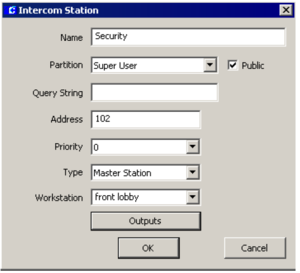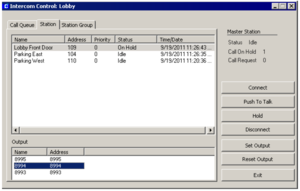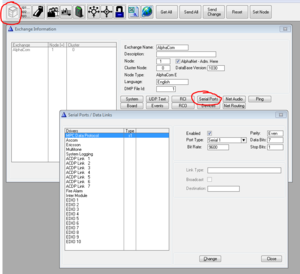Johnson Controls P2000 - ICX-AlphaCom integration
From Zenitel Wiki
(Redirected from Johnson Control P2000)Description
The Johnson Controls P2000 can be integrated with the ICX system or the AlphaCom system. The integration is using the MPC Data Protocol.
The P2000 server can retrieve messages coming from the ICX/AlphaCom and use them for event activation and distribution to P2000 workstations for the processing of intercom history messages and alarms. The P2000 system interfaces with the ICX/AlphaCom system to establish audio communication links between any two or more defined intercom stations. This interface provides P2000 applications to control and display all intercom call requests coming from defined intercom stations. The operator can select a call request from the list and connect to any single intercom station, or to a group of stations.
Licenses
When used with the ICX System, the following license is required in the ICX in order to enable the MPC Data Protocol: 1002602400 - ILI-IF Interface enabling
Features and Benefits
- User-friendly interface — operators can monitor incoming call requests and can connect with an intercom station or station groups. An operator can sort the list of call requests by request time, priority, status, or name. When the call comes, the operator can select any call in the queue and connect the master intercom station to the calling intercom station. Once connected, the operator can place the call on hold or disconnect once the call is completed.
- Interactive display — intuitive maps display the status of intercom stations. If an intercom status changes, the map shows the state change and the location of the intercom device. When the operator receives a call request for a station, the map intercom icon starts flashing. The operator can then click the map icon and connect or disconnect the call.
- React to P2000 events — the intercom equipment connected to the P2000 system can respond to event actions using the Event application. Operators can define event actions that connect or disconnect stations, or events that will trigger upon a station busy, station call request, station connected, or station idle.
- Output setting — Commend intercom systems support output configuration that allows setting or resetting outputs that for example, open doors, turn on lights, or activate alarm sirens.
- Added flexibility — operators can configure the P2000 system to automatically display an image from a camera pointing at an intercom station when the system receives an intercom call request.
- Combine reporting — the Transaction History database stores all intercom history messages and allows you to generate reports that list all intercom transactions in the system.
Installation and Operation
The P2000 server connects to the AlphaCom using the MPC data protocol over a serial connection RS232. As the ICX System does not provide a serial port for such use, an external Ethernet to Serial Converter must be used. Also in larger installations with intercom servers not physically located in close proximity to the P2000 server may require third-party Ethernet to Serial Converter.
To enable the MPC data protocol in AlphaCom, select Exchange & Systems > Serial ports, and enable the MPC Data Protocol on serial port 0 or 1.
To enable communication with the ICX/AlphaCom, the P2000 Intercom Interface Service must run on the P2000 server. Once the ICX/AlphaCom is up and running, intercom commands are carried out on designated P2000 workstations. Each P2000 workstation acting as an intercom control Master Station is associated with a specific Intercom Exchange; each exchange can have designated intercom stations that can only be accessed by that workstation. You can link intercom servers (AlphaNet) to extend the number of intercom stations controlled by a single master intercom station.
Intercom Status
The Intercom Interface Service receives status updates from the ICX or AlphaCom. The appropriate intercom station item is then updated in the database, and an intercom status message is generated and sent to the P2000 messaging chain. Upon receipt of this message, the Real Time List and Real Time Map are modified to accurately display the messages received.




